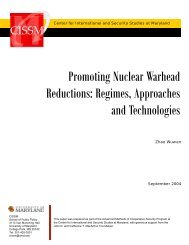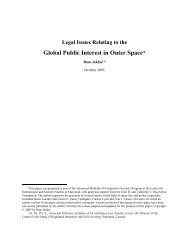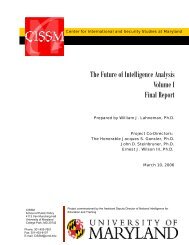A Reassurance-Based Approach to Space Security - Center for ...
A Reassurance-Based Approach to Space Security - Center for ...
A Reassurance-Based Approach to Space Security - Center for ...
- No tags were found...
You also want an ePaper? Increase the reach of your titles
YUMPU automatically turns print PDFs into web optimized ePapers that Google loves.
It has never been amended, but all Consultative members and some Non-Consultativemembers have ratified an Environmental Pro<strong>to</strong>col and a separate Convention on theConservation of Antarctic Marine Living Resources. The treaty system also includes aconvention with a lower level of participation, and the ratification process has just begun <strong>for</strong>legally binding rules on <strong>to</strong>urism adopted at the 2009 Consultative meeting.In the Antarctic Treaty case, the organizing impetus came from the United States. Asthe dominant space power, the United States is best positioned <strong>to</strong> demonstrate leadership inthis case, <strong>to</strong>o. The Bush administration did champion some <strong>for</strong>ms of space cooperation,especially by encouraging other countries <strong>to</strong> adopt and follow space debris mitigationguidelines and challenging China <strong>to</strong> be more transparent about its space programs. But theBush administration was not willing <strong>to</strong> change U.S. space behavior in ways that othercountries would have found reassuring. Nor was it willing <strong>to</strong> commit <strong>to</strong> a process <strong>to</strong>connect voluntary transparency and confidence-building measures with legally binding steps<strong>to</strong> enhance mutual space security.There are a number of steps that the Obama administration could take <strong>to</strong>demonstrate leadership in building a reassurance-based approach <strong>to</strong> space security. It couldexplicitly renounce coercive prevention as the central principle of U.S. security policy;repudiate those elements of the 2006 National <strong>Space</strong> Strategy that are inconsistent with theOuter <strong>Space</strong> Treaty and that reject the idea of making new legally binding commitments; andincrease the transparency of U.S. military space spending. Any one of these steps wouldsignal <strong>to</strong> other key countries that the United States is now seriously interested in exploringspace agreements that could help address all participants’ core security concerns. Given theObama administration’s other priorities, though, and domestic pressures that weigh againstanything that could be construed as a unilateral concession, such U.S. policy changes may beslow in coming unless other countries that care about space security keep trying <strong>to</strong> move theissue <strong>for</strong>ward.One way <strong>to</strong> jump start movement on space security would involve a differentvariation on the process that produced the Outer <strong>Space</strong> Treaty than the option advanced bythe Canadian working paper. Instead of encouraging the CD <strong>to</strong> negotiate a comprehensiveset of soft-law principles <strong>for</strong> space security that could become legally binding obligations at alater date, the fastest way <strong>to</strong> shore up existing normative barriers against deploying weaponsin space and harmful interference with satellites would be <strong>to</strong> induce the United States, China,and Russia <strong>to</strong> make parallel, unilateral declarations pledging not <strong>to</strong> be the first country <strong>to</strong>place any weapon on orbit or <strong>to</strong> interfere with satellites operating in a manner that would beconsidered peaceful and consistent with the OST. As with the 1963 U.S. and Sovietdeclarations that they would not place weapons of mass destruction in space or on celestialbodies, these parallel unilateral declarations could be endorsed by a U.N. General Assemblyresolution that calls on other states <strong>to</strong> exercise similar restraint and <strong>to</strong> negotiate a cooperativeregime <strong>for</strong> space security, either in the CD or in a special <strong>for</strong>um established <strong>for</strong> that purpose.It is not unrealistic <strong>to</strong> hope that the United States, Russia, and China could beinduced <strong>to</strong> issue such declarations at the U.N. General Assembly. Russia has alreadyunilaterally and unconditionally declared that it will not be the first country <strong>to</strong> deploy29







